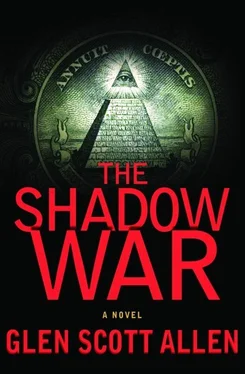Glen Allen - The shadow war
Здесь есть возможность читать онлайн «Glen Allen - The shadow war» весь текст электронной книги совершенно бесплатно (целиком полную версию без сокращений). В некоторых случаях можно слушать аудио, скачать через торрент в формате fb2 и присутствует краткое содержание. Жанр: Триллер, на английском языке. Описание произведения, (предисловие) а так же отзывы посетителей доступны на портале библиотеки ЛибКат.
- Название:The shadow war
- Автор:
- Жанр:
- Год:неизвестен
- ISBN:нет данных
- Рейтинг книги:5 / 5. Голосов: 1
-
Избранное:Добавить в избранное
- Отзывы:
-
Ваша оценка:
- 100
- 1
- 2
- 3
- 4
- 5
The shadow war: краткое содержание, описание и аннотация
Предлагаем к чтению аннотацию, описание, краткое содержание или предисловие (зависит от того, что написал сам автор книги «The shadow war»). Если вы не нашли необходимую информацию о книге — напишите в комментариях, мы постараемся отыскать её.
The shadow war — читать онлайн бесплатно полную книгу (весь текст) целиком
Ниже представлен текст книги, разбитый по страницам. Система сохранения места последней прочитанной страницы, позволяет с удобством читать онлайн бесплатно книгу «The shadow war», без необходимости каждый раз заново искать на чём Вы остановились. Поставьте закладку, и сможете в любой момент перейти на страницу, на которой закончили чтение.
Интервал:
Закладка:
"While I can possibly understand his interest in Ms. Soderbergh," Wolfe said, staring intently at his empty drink, "I find an art historian and a beekeeper hard to explain. But that isn't the question I find most perplexing."
"No?"
"Fletcher's research, whatever it was, apparently didn't involve the necessity of interviewing anyone at the Foundation in the entire six months he was working here. And then suddenly, upon receipt of this letter from Myorkin, he hurriedly arranges three interviews, writes to this Orlova, and discovers a burning need for your rather limited expertise. No offense."
"None taken. That's the question I've been asking ever since he called. Why me?"
Wolfe shook his head. "As central as that question may be to you, it is still not the most important question. In fact, none of these curious connections are."
"Then what on earth is?"
"As I said, Fletcher's been hard at work at the Foundation for six months, and prior to that, for many years. Yet among his things in his office or on his computer there isn't a half-finished white paper, notes for a journal article, an unfinished book… nothing." Wolfe raised his eyebrows. "You see? Where on earth are the fruits of all that labor?"
CHAPTER 8
Wolfe decided it was best they begin interviewing Jeremy's appointments, to see if the focus of his discussions could shed any light on either his sudden interest in art, bees, and Puritans or the direction (or for that matter whereabouts) of all his important work.
They decided to begin where Jeremy had ended, with Mrs. Gadenhower. They learned she had a laboratory in the biology building-one of the few modern structures on the Foundation's campus: a low, functional, nondescript, white stone edifice that appeared to have been constructed in the 1960s. They entered and, tracking the laboratory numbers down black-and-white linoleum-tiled hallways, eventually came to room 133.
Edith Gadenhower was an older woman, at least seventy, her face and manner of expressing herself graced with wonderful continuity. Yet, for all her tea-and-crumpets charm, Benjamin felt there was something undeniably predatory about the small, rotund old woman. Simply put, she gave Benjamin the willies.
Or perhaps it was her surroundings. Oddly, given the modern fixtures-the aluminum counters, Plexiglas cabinets, even racks of electronic equipment Benjamin didn't associate with bee research-the atmosphere in Mrs. Gadenhower's lab was somehow Gothic. Perhaps it was all the test tubes, vials of colored liquids, and specimen jars containing the preserved dead bodies of various kinds of bees.
After showing them several large hives that were intimidating in their frantic and indifferent activity-all from behind the safety of Plexiglas shields-she invited them to sit down. They pulled up two nearby lab stools.
"I can offer you tea," she said, "or there is a regrettable imitation of coffee." She pointed to a small automatic pot jammed in between test tubes and Bunsen burners. They both declined. "Well, then," she said, settling herself on another small stool that seemed hardly able to support her bulk, "how may I help you?"
Wolfe explained that her name had been on Jeremy Fletcher's appointment list, and they were interested in what they'd discussed. Especially as she was the one who'd discovered his body.
"Poor boy," she frowned. "So very young for heart troubles."
"I agree," Wolfe said with a certain harshness. "But we're particularly interested in what he might have said of his own research."
"Nothing," said Edith simply.
"Nothing?" echoed Wolfe.
"I didn't ask. One becomes so focused, you see, on one's own interests. And there really wasn't time. The lad was so very interested in my little fellows, we talked of nothing else."
"Well, perhaps you could hazard a guess, then, Mrs. Gadenhower."
"Edith," she prompted.
"Edith. Excuse me. What have bees to do with nuclear war?"
If Wolfe had hoped to shock her, he was disappointed. She took the question quite in stride. "Oh, a very great deal, I suppose. If you look at it from the right angle."
"And what angle is that?"
"Why, Dr. Fletcher's angle, of course."
"You mean, statistics?"
"What are statistics but a way to tidy up disorderly numbers?" she said firmly. "To the uninitiated, a bee colony looks quite disorderly. But if one stands back, as it were, for perspective, then one sees the method in that apparent madness."
She settled herself in preparation for a short lecture. "The analytical study of bees goes back quite some time. As early as 1705, a Mr. Bernard Mandeville wrote a wonderful book called The Fable of the Bees; or, Private Vices, Publick Benefits. Mr. Mandeville suggested that bee colonies thrive as long as they are organized around in equity. The workers only work, the gatherers only gather, the queen only lays… you see?"
"Well, yes, but how does this…"
"Dr. Fletcher had his own name for Mr. Mandeville's organized inequity. He called it 'swarm intelligence.' " She paused to take a sip of her tea. "And apparently there are those in the Pentagon who believe this idea holds some promise for, what do they call it? Nanotechnology?"
"You mean," interjected Benjamin, "what appears to be random behavior really isn't?"
"Quite the opposite," corrected Edith, smiling sweetly. "What appears centrally organized is often in fact merely the result of thousands of tiny, overlapping little routines. There is no controlling mind-counter to what most people think of the queen-but still an overall purpose is achieved. It's really quite remarkable. Would you like the same demonstration I gave Dr. Fletcher?"
They both nodded. Edith roused herself from the stool, led them to one row of hives behind their Plexiglas shields. The bright fluorescent lights in the ceiling made everything seem abnormally white, and the hum of activity from behind the shields was like a muted dynamo.
Arriving before one of the bee chambers, Mrs. Gadenhower turned to them.
"After studying the dance that bees perform when they return from finding a food source, what is called their 'waggle dance,' I decided to see if the bees could give flight instructions for the colony to navigate to a fight as well as a find. Could this honey-dance serve as a bee warning system, a kind of communal radar?"
They nodded and she continued.
"Actually, I must give credit for the idea to what happened in Poland, immediately following Chernobyl. Beekeepers there began to notice that foraging bees were being stung to death by their own colonies, immediately after they returned home. The other bees could somehow sense they'd been irradiated, you see, and were a danger to the colony. Well, if looked at politically, it seemed a lesson in the creation of enemies to benefit the community. The radioactive bees became a threat that the colony organized to fight, in order to survive. So I decided to re-create those conditions. But without the radiation, of course."
As she spoke she set a container on the counter that contained a single live bee. She took a pair of forceps from the counter and, lifting the lid of the container slightly, inserted the forceps and very gently grabbed the bee with them and took it out of the container.
"Now, my methods may seem rather gruesome, but I assure you, bees have absolutely no equivalent to our sensation of pain."
She paused, the bee struggling in the grip of the forceps. Then she took a pair of tweezers and, one at a time, neatly plucked the wings from the bee. She stepped over to the shield and placed her hand on the handle of a small trapdoor set into the shield. She opened the trapdoor about an inch, put the forceps and bee into the chamber, dropped the bee so that it landed squarely in the middle of one of the honeycombs, then snapped the trapdoor closed.
Читать дальшеИнтервал:
Закладка:
Похожие книги на «The shadow war»
Представляем Вашему вниманию похожие книги на «The shadow war» списком для выбора. Мы отобрали схожую по названию и смыслу литературу в надежде предоставить читателям больше вариантов отыскать новые, интересные, ещё непрочитанные произведения.
Обсуждение, отзывы о книге «The shadow war» и просто собственные мнения читателей. Оставьте ваши комментарии, напишите, что Вы думаете о произведении, его смысле или главных героях. Укажите что конкретно понравилось, а что нет, и почему Вы так считаете.












